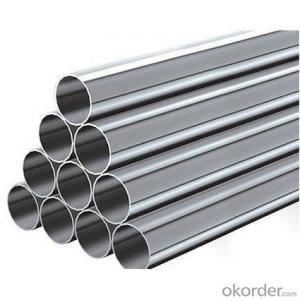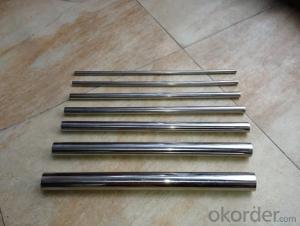sus 304 stainless steel coil roll stainless steel price per kg
- Loading Port:
- Tianjin
- Payment Terms:
- TT OR LC
- Min Order Qty:
- 50 m.t.
- Supply Capability:
- 50000 m.t./month
OKorder Service Pledge
Quality Product, Order Online Tracking, Timely Delivery
OKorder Financial Service
Credit Rating, Credit Services, Credit Purchasing
You Might Also Like
Quick Details
Standard: ASTM, AISI, DIN, EN, GB, JIS
- Model Number: SUS 201 304 316 430
Type: Welded
Steel Grade: 300 Series, TP304
Application: Decorations, constructions,Heat Interchangers and heaters,etc.
Certification: BV
Welding Line Type: ERW
Thickness: 0.25--5.0mm
Outer Diameter: 10*10mm----100*100mm
Length: 6M,or as per requirement
Finishing: Sanded,400 gloss,600--1000 mirror, brushed,etc.
Specification: 30*30*1.5
Packaging & Delivery
| Packaging Details: | Each pipe has the plastic bag to packed it ,and several will be bundled by weaving bag. |
|---|---|
| Delivery Detail: | 25-30 days, depends on customers' order quantity |
sus 304 stainless steel coil roll stainless steel price per kg
Hot selling 304 stainless steel welded square pipe with favorable price
| Specification | |
| Material | 304:0cr18ni9, 0cr17ni8 |
| 201:1cr17mn6ni5n,1cr13mn9ni1n | |
| 316:0cr17Ni12 | |
| or as customer's request | |
| Standard | ASTM A554, Q/GBS1-2005, customers' requests available |
| Size | 10*10mm,12*12mm,18*18mm,23*23mm,38*38mm,50*50mm, |
| 70*70mm,100*100mm,20*10mm,23*11mm,24*12mm, | |
| 25*13mm,36*23mm,40*20mm,50*20mm,60*15mm,75*45mm, | |
| 80*60mm,95*45mm,100*60mm,120*60mm,150*100mm, | |
| (or customized) | |
| Thickness | 0.25mm-5.0mm |
| Length | 6m or according to customers' request |
| Tolerance | Outer diameter:±0.2mm |
| Thickness:±0.05mm | |
| Length:±0.5mm | |
| Process Method | Cold drawn, Annealed with nitrogen protection, Ultrasonic welding, |
| Automatic shape, Polished, Packing. | |
| Ends | In plain end or bevelled ends or as customers' requirements |
| Finishing | A. Sanded |
| B. 400#-600# mirror | |
| C. Hairline brushed | |
| D. TIN titanlum plated | |
| E. HL brushed & mirror(two kinds of finishing for one pipe) | |
| Inner Packing | Plastic bag |
| Outer Packing | Standard gunny packed for each bundle, around 300-500kgs per |
| bundle, or customized according to customers' requests | |
| Application | Heat Interchangers and heaters |
| Decorations, constructions | |
| Oil and chemical industry | |
| Food industry and pharmaceutical industry | |
| Ship-building and automobile manufacturing | |
| Water transportation systems | |
| Performance | Rustless, stainless, good corrosion resistance, anti-wearing, good |
| appearance, excellent mechanical properties | |
| Certification | ISO, SGS,BV. |
| Welding Line Type | ERW(Electrical Resistance Weld) |
| Delivery Detail | 15~25 days, depends on customers' order quantity |
- Q:I remember my dad saying something about steel toed boots but I forgot =#92; I went and checked out all the stores and got a pair with good ankle support but they also have steel toes. Would this interfere with the shifter or anything? I figure if anything my dirt bike shoes have the steel toes too. Any opinion?
- I personally like to feel the shifter, and I've found that I can't feel the shifter as well through steel toed boots. Steel toed boots are designed to protect you in the event of something heavy dropping on your foot - which isn't very likely on a motorcycle. I have also found that in extreme cold that steel toed boots seem to act like a heat sink for your feet - non steel toed boots seem to stay just a little bit warmer. If you're a new rider, a very blunt toe (whether steel or not) can make getting your toes under the shifter a little more difficult, but with some practice and experience, you will get used to it. Honestly, I don't think it really makes all that much difference. All new riders have difficulty with the shifter, and it will take time for you to get used to it either way. I don't think the difference is really even worth going out and buying another set of boots, but yeah, if you were getting your first pair, I would tell you to look for a boot with a toe that is slender and tapered (vs. blunt), and non-steel.
- Q:How do steel coils contribute to the renewable energy sector?
- Steel coils contribute to the renewable energy sector by playing a crucial role in the manufacturing of wind turbines and solar panels. These coils are used to produce the structural components of wind turbine towers and solar panel support structures. Additionally, steel coils are also utilized in the construction of transmission lines and grid infrastructure for renewable energy projects, ensuring efficient distribution of electricity generated from renewable sources.
- Q:How are steel coils tested for strength and durability?
- Steel coils are tested for strength and durability through various methods such as tensile testing, impact testing, and fatigue testing. Tensile testing involves subjecting the steel coil to tension until it breaks, measuring the maximum force it can withstand. Impact testing involves striking the coil with a heavy object to assess its ability to resist sudden shocks. Fatigue testing involves subjecting the coil to repeated load cycles to determine its resistance to long-term stress. These tests help ensure that steel coils meet the required strength and durability standards.
- Q:not iron, steel
- steel was first used in the 1800s in buildings.
- Q:A roll of 1 meters wide color steel roll about how many tons?
- In general, between 3.5 and 5 tons. Our company uses 0.17*1000 white color steel roll. The weight is usually around 4.5 tons. Different manufacturers will have different sealing rolls.
- Q:How are steel coils used in the production of aerospace components?
- Steel coils are used in the production of aerospace components in a variety of ways. One common application is in the manufacturing of structural parts, such as frames, beams, and brackets. Steel coils are often processed into flat sheets or strips, which are then cut and formed into the desired shape for these components. The strength and durability of steel make it an ideal material for these critical parts that need to withstand extreme forces and conditions. Additionally, steel coils are used in the production of engine components, such as turbine blades and combustion chambers. These components require materials with high temperature resistance and excellent mechanical properties. Steel coils are processed and shaped into intricate forms to create these vital engine parts, ensuring efficient and reliable operation. Furthermore, steel coils are used in the production of fasteners, such as bolts, nuts, and screws, which are essential for assembling various aerospace components. The high strength and corrosion resistance of steel make it a preferred choice for these fasteners, as they need to withstand the extreme forces and environments experienced during flight. Overall, steel coils play a crucial role in the production of aerospace components by providing the necessary strength, durability, and reliability required for safe and efficient operation in the demanding aerospace industry.
- Q:How are steel coils tested for dimensional accuracy?
- Steel coils are tested for dimensional accuracy through various methods such as measuring their width, length, thickness, and diameter using specialized tools like calipers, micrometers, or laser measurement systems. These measurements are compared against the specified tolerances provided by the manufacturer to ensure that the steel coils meet the required dimensional standards.
- Q:How can I judge the quality of steel?
- The quality of the alloy can be very well be judged by its appearance and lustrous surface. The more luster on the surface the more refine will the steel be. To judge its tenacity and endurance, the alloy can be subjected to a series of procedures involving stress and shock. There are many more scientific methods of measuring the quality of the alloy such as texture measurement technique etc are also employed. In layman’s term the quality can be measured by the hardness of surface, brightness and smoothness of the surface and absence of any depressions or troughs.
- Q:What are the limitations of using steel coils in certain applications?
- There are several limitations to consider when using steel coils in certain applications. Firstly, steel coils can be heavy and bulky, which makes them less suitable for applications where reducing weight is crucial. Industries like aerospace or automotive, which prioritize lightweight materials for fuel efficiency and performance improvement, may not find steel coils to be the best choice. Secondly, steel coils are prone to corrosion, especially in environments with high moisture or exposure to chemicals. This limitation can restrict their use in applications where corrosion resistance is crucial, such as marine or coastal structures. To mitigate this limitation, additional protective coatings or regular maintenance may be necessary, resulting in increased costs and maintenance efforts. Furthermore, steel coils may lack the necessary flexibility or malleability required for certain applications. Industries like construction or manufacturing, which often require materials to be easily shaped or bent into specific forms, may find steel coils inadequate in terms of flexibility. This limitation can create difficulties in achieving desired designs or may necessitate additional processing steps to mold the steel coils into the desired shape. Lastly, steel coils may have limitations in terms of temperature resistance. In high-temperature applications like furnaces or power generation, steel coils may experience thermal expansion or deformation, compromising their structural integrity. In such cases, alternative materials with higher temperature resistance, such as refractory metals or ceramics, may be more appropriate. Overall, while steel coils are versatile and widely used materials, their limitations in weight, corrosion resistance, flexibility, and temperature resistance can restrict their use in certain applications. It is important to consider these limitations and assess the specific requirements of each application when selecting materials to ensure optimal performance and durability.
- Q:Steel Strings on your guitar or nylons? Why?
- I love steel strings on MY guitar because the brand of strings and the type of guitar I have makes the strings softer on my fingers than other people's Steel Stringed guitars. Nylon sounds weird to me.
1. Manufacturer Overview |
|
|---|---|
| Location | |
| Year Established | |
| Annual Output Value | |
| Main Markets | |
| Company Certifications | |
2. Manufacturer Certificates |
|
|---|---|
| a) Certification Name | |
| Range | |
| Reference | |
| Validity Period | |
3. Manufacturer Capability |
|
|---|---|
| a)Trade Capacity | |
| Nearest Port | |
| Export Percentage | |
| No.of Employees in Trade Department | |
| Language Spoken: | |
| b)Factory Information | |
| Factory Size: | |
| No. of Production Lines | |
| Contract Manufacturing | |
| Product Price Range | |
Send your message to us
sus 304 stainless steel coil roll stainless steel price per kg
- Loading Port:
- Tianjin
- Payment Terms:
- TT OR LC
- Min Order Qty:
- 50 m.t.
- Supply Capability:
- 50000 m.t./month
OKorder Service Pledge
Quality Product, Order Online Tracking, Timely Delivery
OKorder Financial Service
Credit Rating, Credit Services, Credit Purchasing
Similar products
New products
Hot products
Hot Searches
Related keywords





























